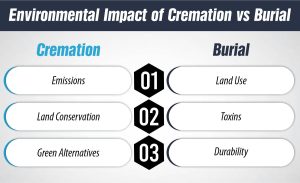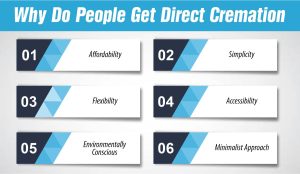What Is the Difference Between Cremation and Direct Cremation?
Last Updated on: May 7th, 2025
Reviewed by Dylan
- Licensed Agent
- - @InsureGuardian
When it comes to end-of-life arrangements, understanding your options is crucial. One common question people ask is: what is the difference between cremation and direct cremation? While both processes involve the reduction of a body to ashes, they differ significantly in procedure, cost, and overall experience. This guide will walk you through both types of cremation, compare them with traditional burial, and help you make an informed decision that aligns with your values, budget, and beliefs.
Understanding Cremation and Direct Cremation
Cremation is a process that uses intense heat and flame to reduce a deceased body to bone fragments, which are then processed into ashes. It has become increasingly popular worldwide as a cost-effective and flexible alternative to traditional burial.Direct cremation, on the other hand, is a simpler and more immediate form of cremation. It takes place shortly after death without any traditional funeral services, embalming, or viewing. The body is collected, cremated, and the ashes are returned to the family without ceremonial add-ons.Key Differences:
- Timing: Cremation may follow a funeral service; direct cremation occurs immediately.
- Preparation: Cremation may involve embalming and viewing; direct cremation skips both.
- Cost: Direct cremation is significantly more affordable.
- Ceremony: Cremation often includes ceremonies; direct cremation typically does not.
What Are the Three Types of Cremation?
Understanding the different types of cremation services helps families make choices that reflect their preferences and budget:a. Traditional Cremation
Includes a full funeral service with a viewing and possibly embalming, followed by cremation. This option retains the ceremonial elements of a burial but substitutes cremation at the end.b. Memorial Cremation
The cremation occurs first. A memorial service is held later without the body present. This offers flexibility for families to plan the event at their convenience.c. Direct Cremation
The most straightforward and budget-friendly choice. There are no formal services beforehand, and the remains are returned directly to the family.Cremation vs. Burial: Cost and Process Comparison
Burial:
- Process: Involves embalming, casket purchase, funeral ceremony, and interment in a cemetery.
- Cost: Traditional burials can cost around $9,995 to $12,000, including grave plots, headstones, and services.
- Additional Fees: Grave opening/closing, maintenance fees, and casket upgrades can significantly increase costs.
Cremation:
- Process: The body is cremated; ashes may be scattered, stored in urns, or buried.
- Cost with service: Approximately $6,280, which includes viewing and funeral arrangements.
- Direct cremation: Typically ranges between $1,000 and $3,000.
Environmental Impact of Cremation vs Burial
Environmental considerations are influencing more families globally:Cremation:
- Emissions: Traditional cremation emits carbon dioxide and mercury (from dental fillings).
- Land Conservation: Requires no burial plot, reducing land use.
- Green Alternatives: Methods like alkaline hydrolysis (water cremation) are emerging as eco-friendlier options.
Burial:
- Land Use: Consumes space in cemeteries that are often permanent.
- Toxins: Embalming chemicals may contaminate the soil.
- Durability: Metal caskets and burial vaults can take centuries to decompose.
How Much Does Cremation Cost With Services?
The cost of cremation varies based on services included:- Cremation with viewing/service: Around $5,000 to $7,000.
- Direct cremation: Usually $1,000 to $3,000, depending on the region and provider.
- USA: $1,000 – $7,000
- UK: £1,200 – £4,000
- Canada: CAD $1,500 – $5,000
- Australia: AUD $2,000 – $6,000
Summary of Average Costs:
- Burial with service: $10,000–$12,000
- Cremation with service: $5,000–$7,000
- Direct cremation: $1,000–$3,000
Funeral vs Burial: Are They the Same?
They are not the same:- Funeral: A ceremonial event to honor the deceased.
- Burial: The physical act of placing the body into the ground.
- Funeral + Burial
- Funeral + Cremation
- Cremation + Memorial Service
- Direct Cremation (no ceremony)
Cremation vs Burial: Spiritual Meaning & Cultural Beliefs
Religious and cultural views greatly impact these decisions:Cremation:
- Hinduism: Considered essential for spiritual release.
- Buddhism: Often practiced as a path to rebirth.
- Christianity: Once frowned upon, now widely accepted.
- Islam/Judaism: Traditionally oppose cremation due to beliefs about bodily resurrection.
Burial:
- Preferred in Christian, Jewish, and Muslim traditions.
- Symbolizes a return to the earth or awaits resurrection.
Why Do People Get Direct Cremation?
Direct cremation is increasingly popular for several reasons:- Affordability: It’s the lowest-cost method.
- Simplicity: Fewer decisions to make during a difficult time.
- Flexibility: Families can hold a memorial later, at their own pace.
- Accessibility: Allows ashes to be shipped globally.
- Environmentally Conscious: Uses fewer resources.
- Minimalist Approach: Appeals to those who want a low-key farewell.
FAQs: Cremation and Direct Cremation
Q1: What’s the main difference between cremation and direct cremation?
A: Cremation may include ceremonies and embalming; direct cremation happens without any services.Q2: Is direct cremation a disrespectful choice?
A: No, it is a respectful and increasingly common option focused on simplicity and privacy.Q3: What are the environmental benefits of cremation?
A: Cremation uses less land and fewer toxic materials than burial, though it does release emissions.Q4: Can you still have a service with direct cremation?
A: Absolutely. Many families plan a memorial after receiving the ashes.Q5: What happens to the ashes after cremation?
A: They can be kept, scattered, buried, or placed in a columbarium.Q6: Why is cremation sometimes more expensive than expected?
A: Costs rise with added services like viewing, embalming, or elaborate urns.Q7: What is interment burial?
A: It is the final placement of remains, whether ashes or a body, into a grave or mausoleum.Q8: What are green or eco-friendly cremation options?
A: Water cremation (alkaline hydrolysis) and biodegradable urns reduce environmental impact.Q9: Is cremation allowed everywhere?
A: Yes in most countries, but cultural or religious practices may influence its use.Final Thoughts
Choosing between cremation, direct cremation, or burial is deeply personal and varies across cultures and families. Direct cremation provides an affordable and respectful choice, offering flexibility for memorials and a reduced environmental footprint. Always consult with licensed providers to understand the specific costs, regulations, and options available in your location.
Expert Life Insurance Agent and health insurance agent
Table of Contents
ToggleDylan is your go-to guy for life and health insurance at InsureGuardian. He’s helped over 2,500 clients just like you figure out the best insurance plans for their needs. Before joining us, Dylan was sharing his expertise on TV with Global News and making a difference with various charities focused on health. He’s not just about selling insurance; he’s passionate about making sure you’re covered for whatever life throws your way.


